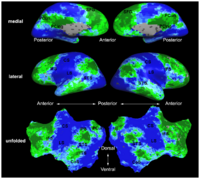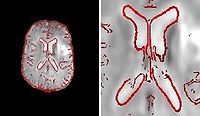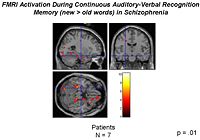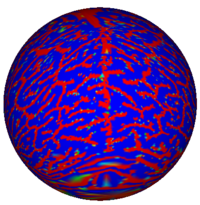NA-MIC Internal Collaborations:fMRIAnalysis
Back to NA-MIC Internal Collaborations
fMRI Analysis
Functional Activation Analysis

|
fMRI clusteringIn this project we study the application of model-based clustering algorithms in identification of functional connectivity in the brain. More... New: 1) D. Lashkari and P. Golland, Exploratory fMRI Analysis without Spatial Normalization. Accepted to IPMI: International Conference on Information Processing and Medical Imaging, 2009. 2) A. Venkataraman, K.R.A. Van Dijk, R.L. Buckner, P. Golland. Exploring Functional Connectivity in fMRI via Clustering. Accepted to ICASSP: IEEE International Conference on Acoustics, Speech and Signal Processing,2009.
|

|
Fieldmap-Free EPI Distortion CorrectionIn this project we aim to improve the EPI distortion correction algorithms More... New: Poynton C., Jenkinson M., Whalen S., Golby A.J., Wells III W. Fieldmap-Free Retrospective Registration and Distortion Correction for EPI-Based Functiona Imaging. MICCAI 2008.
|

|
fMRI Detection and AnalysisWe are exploring algorithms for improved fMRI detection and interpretation by incorporting spatial priors and anatomical information to guide the detection. More... |

|
Brain Activation during Continuous Verbal Encoding and Recognition Task in SchizophreniaThis project employs an event-related auditory verbal episodic memory probe targeting medial temporal and DLPFC circuitry. The task uses a continuous performance format where concrete nouns are presented initially as new items. Words are then repeated after short or long intervals and the participant is required to make a new/old distinction. This design permits analysis of both encoding and recognition processes. More...
|

|
Conformal FlatteningThe goal of this project is for better visualizing and computation of neural activity from fMRI brain imagery. Also, with this technique, shapes can be mapped to shperes for shape analysis, registration or other purposes. Our technique is based on conformal mappings which map genus-zero surface: in fmri case cortical or other surfaces, onto a sphere in an angle preserving manner. More...
|